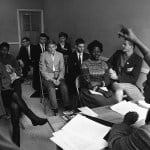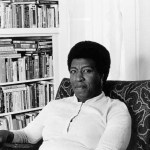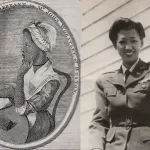Zaila Avant-garde, the multi-talented 14-year-old who won hearts last Thursday as this year’s Scripps National Spelling Bee champ, is the first Black American to ever win the competition. A three-time Guinness World Records holder and basketball prodigy who can bounce juggle while riding a unicycle, she eventually plans to attend Harvard and has already received several full-ride scholarship offers.
Her joyous victory — celebrated by former President Barack Obama, Oprah Winfrey and Avant-garde’s large social media following — sparks the question: How could there be zero other Black American Spelling Bee winners in a contest that has gone on for nearly a century?
“I’m often terrified when someone is the first,” Treva Lindsey, associate professor of women’s, gender and sexuality studies at Ohio State University, told The 19th. “As much as I’m elated and excited, I think about all of the things they came up against and all of the systems, quite frankly, that probably remain intact in spite of this person being the exception.”
Over 11 million students currently participate in the Scripps National Spelling Bee at the school and local level each year, per the organization’s latest count. The only other time a Black student has won the Bee was in 1998, when 12-year-old Jody-Anne Maxwell from Jamaica took the crown.
When discussing her win on Good Morning America, Avant-garde celebrated the historic nature of the moment while wishing for a more inclusive future.
“I’m hoping that in a few years, I’ll see a whole lot more African-American females, and males too, doing well in the Scripps Spelling Bee,” Avant-garde said. “You don’t really see too many African Americans doing too well in spelling bees, and that’s a bit sad because it’s a really good thing … it’s a gate-opener to being interested in education.”
Avant-garde’s win is not just historic — it follows a longer history of Black girls reaching the highest level of achievement at the spelling bee, and facing discrimination when they got to the top.
MacNolia Cox, the first Black student to make it to the National Spelling Bee’s final round in 1936, was described in the Akron Beacon Journal that April as a shy eighth grader who quietly processed the emotional turbulence of the competition. Thirty-five years later, that Beacon Journal reporter, Mabel Norris, revisited the story and added details of the segregation and hostility that the 13-year-old faced.
Cox was “shunted to the Jim Crow car at the Maryland border” on her trip into D.C. for the competition, Norris wrote in 1971. Cox and her mother weren’t allowed to stay with the other contestants at a hotel, eat at the same pre-contest banquet tables with them or use the same elevators.
The judges, “all Southern educators,” as Norris described them, grew “visibly uncomfortable” when Cox was one of five students remaining at the end of the competition. She hadn’t studied the word that ultimately disqualified her from the Bee — “Nemesis”— since it was a capitalized proper noun in her dictionary, referencing the goddess from Greek mythology.
An editorial note within the 1971 article, titled “How Bad It Used To Be,” said that Norris hadn’t included details of segregation in her original story because the “times were different; it wouldn’t have been ‘news’ to anybody,” the Ohio paper wrote.
The note added that Cox “got discouraged and dropped out of school” not long after the competition.
Carol Jenkins, CEO of the ERA Coalition and the Fund for Women’s Equality, reflected on the pressure that Cox must have faced as the first Black girl to stand on the spelling bee’s national stage “among the sea of white faces,” as Norris described it.
“It’s always right under the surface that you’re not just you, but you are an entire race of people and your particular success or failure will either enhance or damage the world’s impression of people of color,” Jenkins told The 19th.
As America continues to recognize how systemic racism has permeated through society, spelling bees aren’t immune, Jenkins said.
“You come to this really nice thing called a spelling bee. And you unearth the same misogynistic, racist history there. And for me, in so many instances, it is centered on Black girls.”
J. Michael Durnil, the Bee’s executive director, told The 19th that the competition is not immune from the country’s history of segregation and racial discrimination — although he pointed to local school districts as perpetuators of that history rather than the Bee itself.
The Bee, he said, “has always been open.”
The organization does not track the demographics of students or judges, including race or ethnicity. But, Durnil told The 19th, “Across a broad swath of 15,000 elementary and middle schools in the country, we are going to hit the diversity of the country at some level.”
The Bee’s plan to get more students to join the competition, and to promote diverse student participation at the local level, is to use a wider range of sponsors such as professional sports teams — to attract students and to encourage entire school districts to sign up instead of just having individual schools within that district compete, Durnil told The 19th.
Lindsey stressed the importance of understanding why someone from a marginalized community is the first to reach a milestone, noting that to dismantle systemic barriers, the conversation can’t end there.
“Have we done the work to dismantle the systems that made her in the position she was, as the first?” Lindsey said, referring to Avant-garde. “And that that first didn’t happen until 2021?”
“You have a moment now that we’re supposed to believe, entirely changes that history, versus perhaps offers an exceptional moment within that history, and then we can see what we want to do with that moment,” she said.
“Let’s ensure that she’s not the last by looking at all of the reasons why she was the first.”
Avant-garde was not, however, the very first. The first American student to win a national spelling bee — before The Courier-Journal launched the competition later adopted by the Scripps Howard News Service — was Marie Bolden, a 14-year-old Black girl from Cleveland.
She won the first national spelling bee in 1908 through a perfect score in the intercity competition overseen by the National Education Association.
Although her perfect score was later revoked because a professor used the wrong definition for “capitol,” local acclaim continued, a Cleveland paper wrote several years ago. But White anger at her participation made its way to distant corners: A New Orleans superintendent, Warren Easton, was censured by his school board for letting the team compete against a Black child, per an account written at the time in The Seattle Republican.
“I did not enter the spelling contest for personal glory, but to try to help bring honor to my teacher and my school,” Bolden said as she stepped from Cleveland’s Hippodrome stage, The New York Times reported that June.
To ensure more Black girls become Bee champions, intentional changes should be made within the competition — and within U.S. education systems — to protect the opportunity for students that come after Avant-garde, Jenkins and Lindsey told The 19th.
“If we don’t want Avant-garde to be singular in that kind of accomplishment … then we have to look at the institution. We have to look at the structures, we have to look at our educational system to be like, ‘OK, what went right here? And what’s been going wrong?’”
At the end of this week and early next week, leaders at the National Spelling Bee will meet to discuss what they learned this year and reflect on ways to improve, Durnil told The 19th.
When asked if the meeting will include discussions on increasing representation for African American students, he said: “our agenda includes talking about, ‘how can we increase representation of all students into this?’”
The victories of Avant-garde, Cox and Bolden — three Black girls who outshone the competition at America’s national spelling bee in its various forms over the decades — are meaningful in a country that often makes them fight to be themselves at every level.
“In this country, people fail to take into effect the talk that Black girls have to get,” Jenkins told The 19th. “And that is, that you live in a country that may not love you.”
The Akron Beacon Journal on Sunday ran an homage to Cox, who died in 1976. The paper wrote: “It finally happened, MacNolia Cox. Eighty-five years after you blazed the trail, an African American girl won the Scripps National Spelling Bee.”







